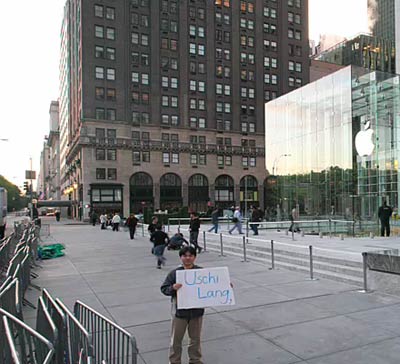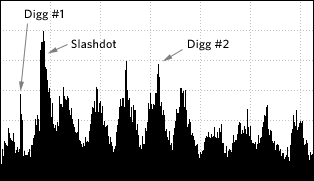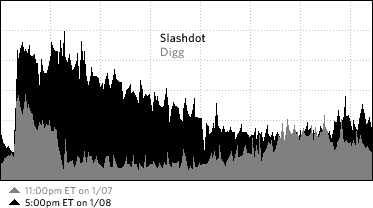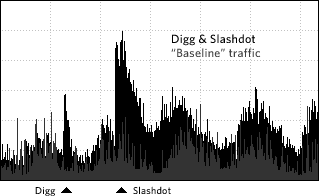kottke.org posts about Apple
Apple opened a new retail store last night on 5th Avenue here in New York City. Since 5pm yesterday evening, they’ve had a camera trained on the store to capture the first 24 hours of the festivities and are displaying the results in a time-lapse movie on the store’s site. During the 5am segment of the movie, an enterprising Apple acolyte showed up and proposed to his girlfriend by holding up signs in front of the camera:



Does anyone know who this person is? Please email me if you do…I want to know how this turned out!
As it happens, this was the second marriage proposal at the opening…the eighth person in line proposed to his girlfriend right before the store opened and she said yes. Geek love!
Update: Uschi apparently said yes! (I say apparently because this blogspot site has the story and I’m assuming it was copied without attribution from a news site or newspaper but I can’t find the actual source.) (thx, robert)
Update: My pal David thinks the acceptance is a hoax…that blogspot site is filled with other fake news stories. I was fished in!!
Two graphic design teams recently went head-to-head on The Apprentice. The winning team had flat-panel monitors, OS X, and Adobe Creative Suite while the losers were still using an old version of Quark on Mac OS 9 displayed on a gigantic CRT monitor. “Graphic Design Lesson A: Get the latest hardware and software, and you will win. Always.”
John Gruber has more information on what’s going on with Aperture at Apple. Bottom line: by throwing too many engineers at the problem, they made a late project later (see The Mythical Man Month, one of my favorite business books), and after it shipped, all those extra engineers were redispersed within the company and the managers responsible for the debacle got the boot. Good stuff.
Good new series of ads for Apple; “Get a Mac”. I’m pretty sure the chap playing the PC is John Hodgman (author, Daily Show correspondent, This American Life commentator, former literary agent, monthly readings holder, hobo expert). Can anyone confirm? (via df)
Update: According to MacRumors, the Mac is played by Justin Long.
Update #2: Yep, seems to be Hodgman.
Steve Jobs to Apple shareholders: I have no interest in running Disney. He also said that he’ll be spending less time at Disney than he did at Pixar, which is good news for Apple.
What the huh? Apple has disbanded the development team for Aperture? Gruber, tell me what I think about this.
Short remembrance by Rob Janoff about designing the logo for Apple Computer. The logo was to be black & white to save on printing costs, but “Jobs was resolute, arguing that color was the key to humanizing the company”.
John Gruber on Apple’s Boot Camp, which lets you install Windows XP on your Mac (in beta). “You now get to choose between a computer that can only run Windows or a computer that can run both Windows and Mac OS X.”
Olympic snowboarders competed while listening to their iPods. The goal? Effortless concentration. “It enables you to focus on what you’re doing without actually focusing, if that makes any sense. You’re not over-thinking, and that’s the best way to perform the harder tricks and maneuvers.”
Camino, a web browser for the Mac, finally goes 1.0. It seems like 5 years have passed since I switched away from Camino. I loved it then and I’d switch back in a second if had the features of and was being developed to the extent of Firefox or Safari. (via df)
Matt calculates the cost of a la carte television, i.e. ordering TV shows from iTunes. His yearly cable bill is $648 but the cost of watching all hs favorite shows from iTunes would be $800. I bet the networks love this math, especially since it cuts the cable companies out of the loop. But in an a la carte-only world, how would you discover shows in the first place?
Some interesting photomosaics. This one of Steve Jobs is made of OS X icons and this woman is a collage of Macs and other Apple products.
It’s a done deal…Disney is buying Pixar. This bums me out in a lot of different ways. The big winner? Apple Computer.
[This is a semi-regular feature following up on stuff I’ve posted here recently.]
As expected, the Digg vs. Slashdot post got featured on Digg but not on Slashdot. In my analysis, I noted:
The Digg link happened late Saturday night in the US and the Slashdot link occurred midday on Sunday. Traffic to sites like Slashdot and Digg are typically lower during the weekend than during the weekday and also less late at night. So, Digg might be at somewhat of a disadvantage here and this is perhaps not an apples to apples comparison.
Several folks complained about this, some saying that it invalided the whole thing. The Digging of the DvS piece gives us another look at the Digg effect, from right in the middle of a weekday. Digg #2 was dugg 1441 times, got 98 comments, and sent around 10,200 people to kottke.org. By contrast, Digg #1 was dugg 1387 times, garnered 65 comments, and sent ~20,000 people to kottke.org. Digg #1 was actually more successful in driving traffic to kottke.org on a Saturday night than Digg #2 on a Thursday afternoon. Here’s a graph that compares the three events:

It’s hard to see the exact effect of Digg #2 on this graph (I forgot to grab a screenshot of the bandwidth graph when it happened, so all I have is the historical wide view), but it doesn’t stand out that much from what happened the previous day (each one of those “bumps” is a day) and didn’t have much of an effect beyond the initial spike. However, judging from the traffic that the individual Digg pages drove to kottke.org (Digg #1: 4525 people; Digg #2: 2668 people), it looks like the iPod feature was more interesting to the Digg audience than the Digg v. Slashdot post (which makes sense). So, still not exactly a fair comparison and raises more questions than provides answers.
The James Frey thread ended up with almost 950 comments before I shut it down because of redundancy and a lot of nastiness on the part of a few participants. The kottke.org record for most comments on a post is nearly 1800 on this post about The Matrix Reloaded (continued here)….that conversation, while nerdy, was a lot more civil.
After reading some of those comments and other things written about the controversy (but without having read the book), my take on Frey is that memories are subjective and readers need to cut authors some slack on that when writing memoirs. However, Frey stepped over the line in manufacturing situations that didn’t happen and deserves the backlashing he’s now receiving. My favorite observation on this whole deal was made by Stephen on a mailing list we’re both on. In a 2003 interview for The Observer, Frey said:
I don’t give a fuck what Jonathan Safran whatever-his-name or what David Foster Wallace does. I don’t give a fuck what any of those people do. I don’t hang out with them, I’m not friends with them, I’m not part of the literati…A book [Eggers’ AHBWOSG] that I thought was mediocre was being hailed as the best book written by the best writer of my generation. Fuck that. And fuck him and fuck anybody who says that. I don’t give a fuck what they think about me.
To Oprah on Larry King last week, Frey had this to say:
I admire you tremendously and thank you very much for your support. And, you know, it’s — I’m still incredibly honored to be associated with you, and I will for the rest of my life. Thank you.
The man knows who buttered his bread, that’s for sure. Oh, and The Onion’s take is good too. “Accounts of assault with a deadly weapon, narcotics possession, and incitement of riot actually happened during 2002 Grand Theft Auto session.”
Several folks picked up on the year in cities meme…check out the trackbacks on my post and on IceRocket for a bunch of other people’s lists.
Many didn’t realize that my letter to Apple Support was a joke. Sure, I had post-MacWorld gadget lust, but my new Powerbook is great, does everything I want, and I don’t really want the new one. Besides, everyone knows you don’t buy the first version of new Apple hardware…I’m waiting until they work all the kinks out. Here’s a not-so-positive review of the MacBook Pro announcement at Unsanity.
More chatter about the new corporate logos for Kodak, Intel, UPS, and AT&T.
I was wondering much the same thing as Michael re: iTunes phoning home with your listening history. Isn’t that what we want? Our software watching and making recommendations for us…isn’t that helpful? Providing better, more targetted advertising (if we have to have advertising, it should be useful)? There are privacy concerns and companies should be clearer about what’s going on, but I don’t mind if the software I use is a little smarter.
There’s been lots of talk on the web lately about Digg being the new Slashdot. Two months ago, a Digg reader noted that according to Alexa, Digg’s traffic was catching up to that of Slashdot, even though Slashdot has been around for several years and Digg is just over a year old. The brash newcomer vs. the reigning champ, an intriguing matchup.
Last weekend, a piece on kottke.org (50 Fun Things to Do With Your iPod) was featured on Digg and Slashdot[1] and the experience left behind some data that presents a interesting comparison to the Alexa data.
On 1/7 at around 11:00pm ET (a Saturday night), the 50 Things/iPod link appeared on Digg’s front page. It’s unclear exactly what time the link fell off the front page, but from the traffic pattern on my server, it looks like it lasted until around 2am Sunday night (about 3 hours). As of 10pm ET on 1/11, the story had been “dugg” 1387 times[2], garnered 65 comments, and had sent ~20,000 people to kottke.org.
On 1/8 at around 5pm ET (a Sunday afternoon), the 50 Things/iPod link appeared on Slashdot’s front page and was up there for around 24 hours. As of 10pm ET on 1/11, the story has elicited 254 comments and sent ~84,100 people to kottke.org.
Here’s a graph of my server’s traffic (technically, it’s a graph of the bandwidth out in megabits/second) during the Digg and Slashdot events. I’ve overlaid the Digg trend on the Slashdot one so you can directly compare them:

That’s roughly 18 hours of data…and the scales of the two trends are the same. Here’s a graph that shows the two events together on the same trend, along with a “baseline” traffic graph of what the bandwidth approximately would have been had neither site linked to kottke.org:

That’s about 4.5 days of data. Each “bump” on the baseline curve is a day[3].
The two events are separated by just enough time that it’s possible to consider them more or less separately and make some interesting observations. Along with some caveats, here’s what the data might be telling us:
- The bandwidth graphs represent everything that was happening on the kottke.org server during the time period in question. That means that bandwidth from all other outgoing traffic is on there, mixed in with that caused just by the Digg and Slashdot traffic. According to my stats, no other significant events happened during the period shown that would cause unusual amounts of bandwidth to be consumed. Including the baseline traffic (from mid-December actually) on the second graph is an attempt to give you an idea of what it looks like normally and so you can see what effect the two sites had on the traffic.
- The Digg link happened late Saturday night in the US and the Slashdot link occurred midday on Sunday. Traffic to sites like Slashdot and Digg are typically lower during the weekend than during the weekday and also less late at night. So, Digg might be at somewhat of a disadvantage here and this is perhaps not an apples to apples comparison.
- I’m pretty sure that the person who submitted this link to Slashdot got it from Digg or at least from a site that got it from Digg. Bottom line: if the iPod thing, which is several months old, hadn’t been Dugg, it would not have appeared on Slashdot the next day.
- If you look at the first 16-18 hours of the link being both sites (first graph), you’ll see that the traffic from Slashdot was initially larger and stayed large longer than that from Digg. Stories appear to stay on the front page of Slashdot for about a day, but the churn is much faster on Digg…it only lasted three hours and that was late on a Saturday night.
- Slashdot sent roughly 4 times the traffic to kottke.org than Digg did since Saturday.
- If you look at the second graph, Slashdot appears to have a significant “aftershock” effect on the traffic to kottke.org. The traffic went up and stayed up for days. In contrast, the traffic from Digg fell off when the link dropped off the front page and increased traffic a little the next day (compared to the baseline) before Slashdot came and blew the doors off at 4pm. Some of this difference is due to the late hour at which the link was Dugg and how much longer the link remained on the Slashdot front page. But that doesn’t account for the size and duration of the aftershock from Slashdot, which is going on three days now.
- The traffic from the Slashdot link obscures any secondary Digg effect beyond 16-18 hours. But the bump in traffic (if any) from Digg on Sunday afternoon pre-Slashdot was not that large and was declining as the afternoon wore on, so any possible Digg aftershock that’s obscured by the Slashdot link is minimal and short-lived.
- I’m guessing the Slashdot aftershock is due to 1) traffic from links to kottke.org from other blogs that got it from Slashdot (from blogs that got it from those blogs, etc.), 2) people passing the link around via email, etc. after getting it from Slashdot, 3) Slashdot visitors returning to kottke.org to check out other content, and 4) an embedded Digg mini-aftershock of linkers, emailers, and repeat visitors. The del.icio.us page for the 50 ways/iPod link shows that before 1/8, only a few del.icio.us users per day were bookmarking it, but after that it was dozens per day.
In terms of comparing this with the Alexa data, it’s not a direct comparison because they’re measuring visitors to Digg and Slashdot, and I’m measuring (roughly) visitors from each of those sites. From the kottke.org data, you can infer how many people visit each site by how many people visited from each site initially…the bandwidth burst from Slashdot was roughly about 1.8 times as large as Digg’s. That’s actually almost exactly what Alexa shows (~1.8x).
But over a period of about 4 days, Slashdot has sent more than 4 times the number of visitors to kottke.org than Digg — despite a 18-hour headstart for Digg — and the aftershock for Slashdot is much larger and prolonged. It’s been four days since the Slashdotting and kottke.org is still getting 15,000 more visitors a day than usual. This indicates that although Digg may rapidly be catching up to Slashdot traffic-wise, it has a way to go in terms of influence[4].
Slashdot is far from dying…the site still wields an enormous amount of influence. That’s because it’s been around so long, it’s been big, visible, and influential for so long, and their purpose is provide their audience with 20-25 relevant links/stories each day. The “word-of-mouth” network that Slashdot has built over the years is broad and deep. When a link is posted to Slashdot, not only do their readers see it, it’s posted to other blogs (and from there to other blogs, etc.), forwarded around, etc. And those are well-established pathways.
In contrast, Digg’s network is not quite so broad and certainly less deep…they just haven’t been around as long. Plus Digg has so much flow (links/day) that what influence they do have is spread out over many more links, imparting less to each individual link. (There are quite a few analogies you can use somewhat successfully here…the mafia don who outsmarts a would-be usurper because of his connections and wisdom or the aging rock group that may currently be less popular than the flavor of the month but has collectively had a bigger influence on pop music. But I’ll leave making those analogies as an exercise to the reader.)
What all this suggests is that if you’re really interested in how influence works on the web, just looking at traffic or links doesn’t tell you the whole story and can sometimes be quite misleading. Things like longevity, what the social & linking networks look like, and how sites are designed are also important. The Alexa data suggests that Digg has half the traffic of Slashdot, but that results in 4x the number of visitors from Slashdot and a much larger influence afterwards. The data aside, the Digg link was fun and all but ultimately insignificant. The Slashdot link brought significantly more readers to the site, spurred many other sites to link to it, and appears to have left me with a sizable chunk of new readers. As an online publisher, having those new long-term readers is a wonderful thing.
Anyway, lots of interesting stuff here just from this little bit of data…more questions than conclusions probably. And I didn’t even get into the question of quality that Gene brings up here[5] or the possible effect of RSS[6]. It would be neat to be a researcher at someplace like Google or Yahoo! and be able to look more deeply into traffic flows, link propagation, different network topologies, etc. etc. etc.
[1] The way I discovered the Digging and Slashdotting was that I started getting all sorts of really stupid email, calling me names and swearing. One Slashdot reader called me a “fag” and asked me to stop talking about “gay ipod shit”. The wisdom of the crowds tragedy of the commons indeed.
[2] On Digg, a “digg” is a like a thumbs-up. You dig?
[3] That’s the normal traffic pattern for kottke.org and probably most similar sites…a nearly bell-shaped curve of traffic that is low in the early morning, builds from 8am to the highest point around noon, and declines in the afternoon until it’s low again at night (although not as low as in the morning).
[4] The clever reader will note here that Slashdot got the link from Digg, so who’s influencing who here? All this aftershock business…the Slashdotting is part of the Digg aftershock. To stick with the earthquake analogy though, no one cares about the 5.4 quake if it’s followed up by a 7.2 later in the day.
[5] Ok, twist my arm. Both Digg and Slashbot use the wisdom of crowds to offer content to their readers. Slashdot’s human editors post 25 stories a day suggested by individual readers while Digg might feature dozens of stories on the front page per day, collectively voted there by their readers. In terms of editorial and quality, I am unconvinced that a voting system like Digg’s can produce a quality editorial product…it’s too much of an informational firehose. Bloggers and Slashdot story submitters might like drinking from that hose, but there’s just too much flow (and not enough editing) to make it an everyday, long-term source of information. (You might say that, duh, Digg doesn’t want to be a publication like Slashdot and you’d probably be right, in which case, why are people comparing the two sites in the first place? But still, in terms of influence, editing matters and if Digg wants to keep expanding its influence, it’s gotta deal with that.)
[6] Digg might be more “bursty” than Slashdot because a higher percentage of its audience reads the site via RSS (because they’re younger, grew up with newsreaders in their cribs, etc.). Brighter initial burn but less influence over time.
From: [email protected]
Subject: Powerbook support
Date: January 10, 2006 4:55:31 PM ET
To: Apple Tech Support
Hello,
I purchased a new Powerbook three weeks ago. It was working fine until a few hours ago when you announced the new Intel-powered MacBook Pro at MacWorld and I started to cry. “Four to fives times faster,” I sobbed, “a built-in iSight, and a brighter, wider screen.”
My display, while not as bright or large as the new MacBook Pro display, illuminated my wet cheeks and red, swollen eyes as my tears rained down on the backlit keyboard. An acrid smell rose up from inside the smooth metal machine as my salty tears joined with the electronics, joyfully releasing the electrons from their assigned silicon pathways to freely arc into forbidden areas of the computer and elsewhere, including, somewhat painfully, my hands.
Is this covered under my warranty and if so, can you send me a new MacBook Pro as a replacement, please? Thank you for your time,
-jason
Going to try doing an live update of what Jobs is announcing at MacWorld. If you’d like to drink right from the firehose, here’s the MacRumors feed. (Note, I’m not at MacWorld, so I have no idea why I’m doing this except it’s kinda fun and old school in a way.)
- 32 million iPods sold in 2005
- Selling at the rate of a billion songs a year on iTunes Music Store
- Offering SNL skits through iTunes, all your old favorites
- Remote control for iPod with an FM tuner in it…listen to FM radio with the iPod
- 40% of the cars sold in the US in 2006 will have iPod integration
- Announced some new Dashboard widgets, including one for snow conditions for skiing
- 10.4.4
- Update to iLife….iLife ‘06
- New iPhoto will handle 250,000 photos (!!!), full-screen editing, more printing options (postcards calendars)
- Photocasting - podcasting for photos (Flickr competitor?), uploads photos to .Mac to iPhoto, people can subscribe, anyone can view photos via RSS
- Create video podcasts with iMovie, dump video to iPod
- iDVD creates widescreen DVDs, something called Magic iDVD that makes it super easy to create DVDs…drag and drop and push a couple buttons
- use iChat to record audio interviews with GarageBand (I think….), ah, ok, GarageBand has a Podcast Studio in it, use it to produce podcasts
- Announcing iWeb. Share photo albums, publish blogs, podcasting, Apple-designed templates. One-click publishing to .Mac. RSS, of course (lots of RSS stuff in iLife). A bit hard to see what this is exactly when you’re not watching these demos in person. Also includes some sort of online media browser w/AJAX…works in any browser. “integrated with your music library”, whatever that means.
- iWork ‘06…. (nothing really new here)
- Talking about new hardware. Intel update…looks like OS X on Intel is ready. New Mac today with Intel chip. It’s the iMac. Ahead of schedule (Apple originally said mid-year).
- Intel iMac is 2 to 3 times faster than the G5, Tiger (10.4.4) is native on the Intel processor, all of Apple’s apps are too.
- Microsoft will make new versions of office for the Mac for a minimum of 5 years
- New Intel iMacs shipping today. They will be doing Intel versions of all their hardware this calendar year.
- Famous Jobs’ “one more thing”….MacBook Pro, Powerbook with Intel chip, 4-5 times faster than the G4 Powerbook, magnetic power adapter
Ok, all done. Check out Apple.com for all the new stuff. Apple’s stock price is up 5 points (~6%) on today’s news.
Adobe has released the beta version of a program called Lightroom (OS X only), a competitor to Apple’s Aperture. Both are pro-level apps for manipulating and organizing digital photos. Here’s the story of Lightroom’s development from one of its developers. (via df)
Newer posts
Older posts











Stay Connected